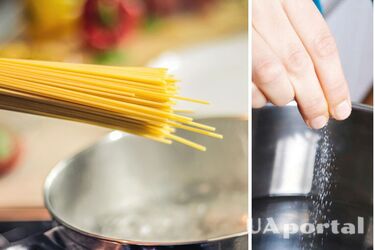Everyone makes this mistake: When to salt pasta

Cooking macaroni is a simple and accessible process even for people who are not involved in culinary skills. However, the correct addition of salt during the preparation of pasta is of great importance for the quality of the finished dish.
Read also: Why it is dangerous to wash raw meat before cooking
Experienced cooks offer some tips on when to add salt when cooking pasta. Some people pour a whole spoonful of salt into the still-cold water before adding the pasta, while others may not understand why you need to salt the water at all while cooking the pasta.
The answer to this question is quite simple: salt, a few teaspoons of sunflower oil, and a properly calculated portion of water will prevent your pasta from sticking together or ungluing. In addition, pasta without salt will be too fresh. Thanks to the salt, the side dish will be well-cooked but will remain moderately soft.
Salt should be added to boiling water so that it is completely dissolved. Only after that, you can add pasta. However, if you add salt to cold water, it will boil faster. It is important to stir the pasta so that it does not stick together.
A common mistake is to add salt to an already prepared pasta dish, but this approach can spoil the consistency of the pasta during cooking, make the dish lean and even give it an unpleasant "plastic" smell. In addition, the salt may not be evenly distributed throughout the pasta.
The optimal amount of salt to add to pasta depends on the number of servings. In general, it is recommended to add approximately 8-10 g of salt to each liter of water, which corresponds to one to two pinches. In particular, for a pot of one portion of pasta, you can use 8-10 g of salt, for two portions - 16-20 g, and so on.
We will remind you that earlier we wrote about how to cook pasta so that it sticks together.
If you want to receive the latest news about the war and events in Ukraine, subscribe to our Telegram channel!
